DOI:
10.1590/1809-6891v20e-52626
ZOOTECNIA
MACAÚBA MEAL LEVELS IN THE DIET OF NAKED NECK BROILERS
NÍVEIS DE FARELO DE MACAÚBA NA DIETA DE FRANGOS DE CORTE DE PESCOÇO
PELADO
Milena
Wolff Ferreira1* ORCID http://orcid.org/0000-0001-9763-2239
Gabriel
Correa Dias1 ORCID http://orcid.org/0000-0001-9146-115X
Thiago
Rodrigues Silva1 ORCID http://orcid.org/0000-0001-5151-8510
Charles Kiefer2 ORCID http://orcid.org/0000-0001-9622-2844
Ulisses
Simon Silveira3 ORCID http://orcid.org/0000-0001-9416-0571
Rubia
Renata Marques1 ORCID http://orcid.org/0000-0002-6994-8938
1Universidade
Católica Dom Bosco, Campo Grande, MS, Brasil.
2Universidade
Federal do Mato Grosso do Sul, Campo Grande, MS, Brasil.
3Universidade Estadual de Mato Grosso do Sul, Campo Grande,
MS, Brasil.
*Correspondent author - milenawolff@ucdb.br
Abstract
A total of 375-day-old naked neck chicks were distributed
in a completely randomized design in five diets with 0, 2, 4, 6, and 8%
macaúba meal levels to evaluate colonial broiler chickens. The data were
submitted to linear or quadratic regression analysis according to the
best fit for each studied variable using the statistical program SAS
9.0. Macaúba meal levels increased feed intake without influencing
weight gain, resulting in worsening feed conversion and leading to a
linear reduction in slaughter weight at 85 days and reduction in carcass
yields due to higher abdominal fat deposition. Linear effects were found
on the contents of a*, pH, ethereal extract, and ash in the breast and
b*, moisture, ethereal extract, and ash in the drumstick + thigh. Thus,
macaúba meal inclusion in the diet of naked neck broilers impaired
performance by increasing diet intake, impairing feed conversion and
reducing carcass yields. However, it favors breast, drumstick, and thigh
colors because it is rich in carotenoids.
Keywords:
Acrocomia aculeata.
Alternative foods. Alternative poultry farming.
Resumo
Para avaliar níveis de farelo de
macaúba na dieta de frangos de corte tipo colonial foram utilizados 375
pintos de um dia, da linhagem pescoço pelado, distribuídos em
delineamento inteiramente casualizado. em
5 dietas
com níveis de 0, 2; 4; 6; e 8% de farelo de macaúba. Os
dados obtidos foram submetidos a análises de regressão linear ou
quadrática, conforme o melhor ajustamento obtido para cada variável
estudada, utilizando-se o programa estatístico SAS 9.0. Os
níveis de farelo de macaúba aumentaram o consumo de ração sem
influenciar no ganho de peso, resultando na piora da conversão
alimentar. Causaram redução linear no peso de abate aos 85 dias e
redução nos rendimentos de carcaça em função da maior deposição de
gordura abdominal. Foram observados efeitos lineares nos teores de a*,
pH, extrato etéreo e cinzas no peito e sobre os teores de b*, umidade,
extrato etéreo e cinzas na coxa + sobrecoxa. Conclui-se que a inclusão
do farelo de macaúba na dieta de frangos de pescoço pelado prejudica o
desempenho por aumentar o consumo da dieta, prejudicando a conversão
alimentar e reduzindo os rendimentos de carcaça. Entretanto, por ser
rico em carotenoides favorece a coloração de peito, coxa e sobrecoxa.
Palavras-chave:
Acrocomia
aculeata.
Alimentos alternativos. Avicultura alternativa.
Recebido em: 23 de abril de 2018.
Aceito em 20 de maio de 2019.
Introduction
The search for alternative foods that do not compete with human food is a significant challenge for animal farming.
Feeding represents the largest portion of production costs in poultry farming and, therefore, the use of quality alternative feeds and known compositions for the formulation of minimum cost feed allow a more economical adaptation to the producer.(1)
In this sense, studies have been developed to update the nutritional values of foods commonly used in poultry feed and knowing the nutritional value of new foods. However, studies are still needed to demonstrate animal performance when replacing conventional feed with alternative nutrient sources.
Another major global concern is about clean and renewable energy production that can replace the use of oil derivatives. Among the various alternatives is biodiesel production and among the oilseed species that can be used to produce this biofuel is macaúba (Acrocomia aculeata). Macaúba has better yield conditions in Cerrado lands, where practically does not suffer from disease attack and has a high oil content.(2) Macaúba pulp accounts for around 45% of the fruit composition(3) and provides an orange-yellow oil rich in bioactive compounds and, in the fatty acid composition, high levels of oleic and palmitic acid.(4, 5, 6)
Macaúba meal, a residue from the extraction of oil from fruit pulp, can be a viable co-product for animal feed. In studies on ruminant feeding, different authors have found that it is possible to replace conventional protein feeds such as soybean meal with macaúba meal or cake.(7, 8, 9, 10, 11) However, there is little information in the literature regarding the use of this food in the diet of broilers. Therefore, conducting the study may generate information on the effects of this food as an alternative food source on performance and carcass and indicate the best inclusion level to be used in practice.
Therefore, this study was carried out to evaluate macaúba meal levels in the diet of colonial broilers in performance and carcass characteristics.
Material and methods
This study was approved by the Research Ethics Committee of the Universidade Católica Dom Bosco (CEUA) under protocol No. 067/2014, and the experiment was conducted at the facilities of the poultry sector of the Fazenda Escola – Instituto São Vicente and Laboratory of Animal Nutrition, belonging to the Universidade Católica Dom Bosco (UCDB), Campo Grande, MS.
A total of 375 day-old naked neck chicks, with a mean initial weight of 42.56±1.32 g, were distributed in a completely randomized design with five experimental diets (macaúba meal inclusion levels, %), five replications, and 15 animals per experimental unit.
Animals were housed in the same shed equipped with 25 boxes with internal measures of 1.75 × 2.40 m. Each box contained a suspended tubular feeder, an automatic pendant drinker, a 100W campanula, and approximately 6 cm of wood shavings.
The breeding system adopted was semi-intensive. The animals remained in confinement for up to 28 days and, after the initial phase, each box had access to a 60-m2 paddock of Tifton grass during the day.
Macaúba meal was obtained by cold pressing the pulp to extract the oil and then drying the cake. Chemical composition and gross energy value of macaúba meal used in the formulation of experimental diets are shown in Table 1.

Experimental diets were formulated to meet the nutritional requirements of animals according to the linage manual(12) and growth phase, and each of them contained one of the following five macaúba meal levels: 0, 2, 4, 6, and 8% (Tables 2, 3, and 4).
The nutritional requirement in minerals and amino acids was met using mineral sources and industrial amino acids, aiming to maintain the minimum values obtained for diets free of alternative food in the different phases.
Humidity and maximum and minimum temperatures were measured during the experimental period by a digital thermohygrometer. The evaluated performance characteristics were weight gain, final weight, average feed intake, and feed conversion, measured from 1 to 28, 29 to 56, and 57 to 85 days old.
Animals were pre-slaughter fasted for 8 hours, weighed, stunned by electronarcosis, bled, and plucked at the end of the growth phase (85 days). The entire process was performed manually, and carcasses were not chilled. Carcasses were eviscerated and weighed to calculate carcass yield and fat percentage and then refrigerated. The measurements of pH were performed in the chest and drumstick muscles using a digital pH meter 24 hours after slaughter with the chilled carcasses. Subsequently, carcasses were packed in plastic bags and frozen at −20 °C. After 7 days, carcasses were thawed, ground, and homogenized for analysis of dry matter, ethereal extract, crude protein, and ashes, according to AOAC standards.(14)
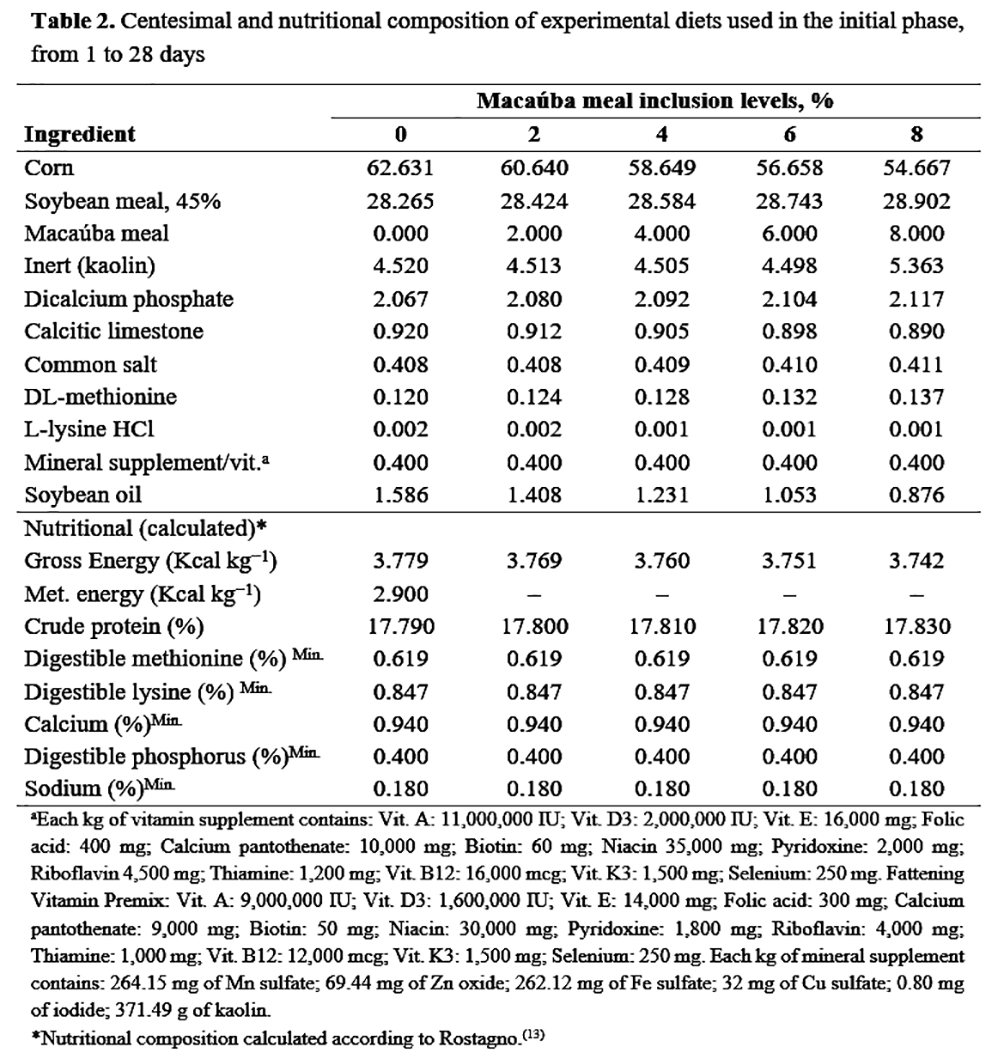
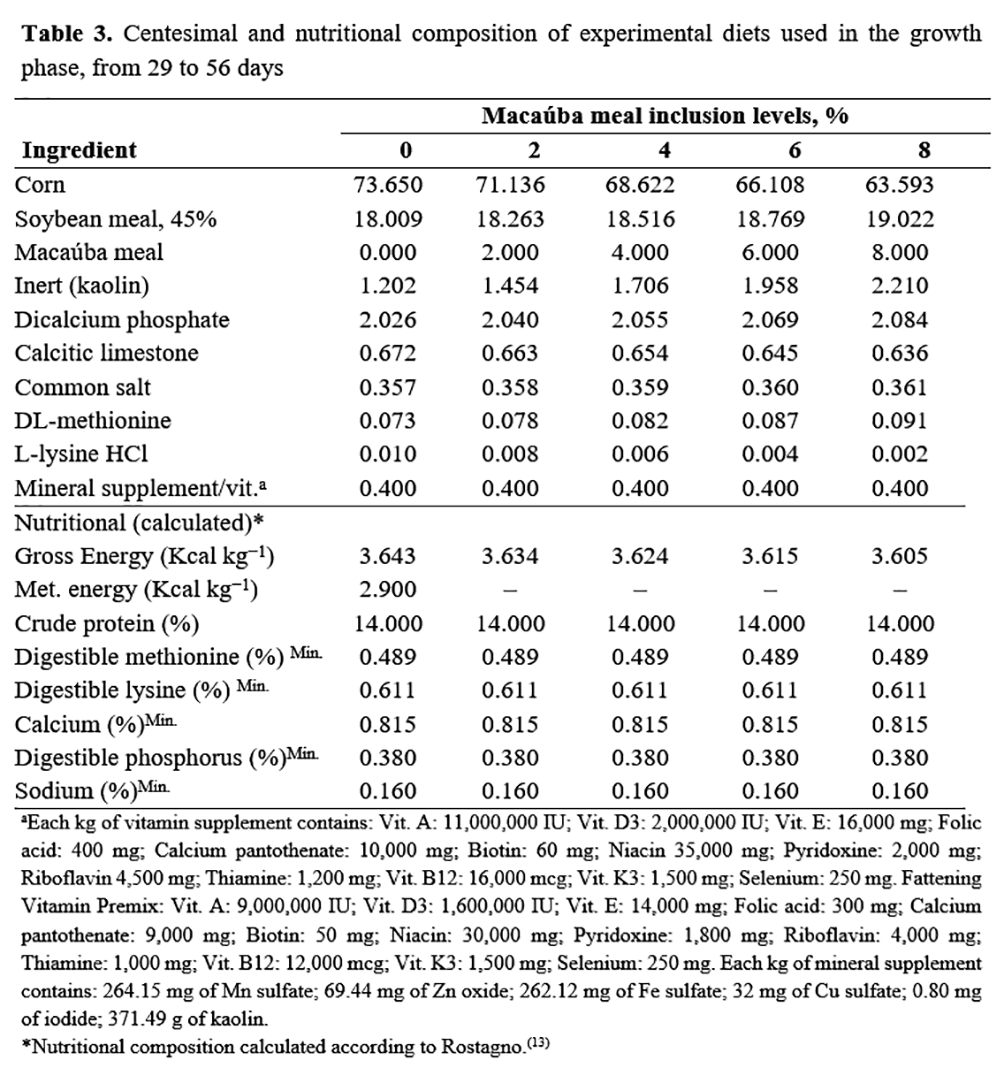
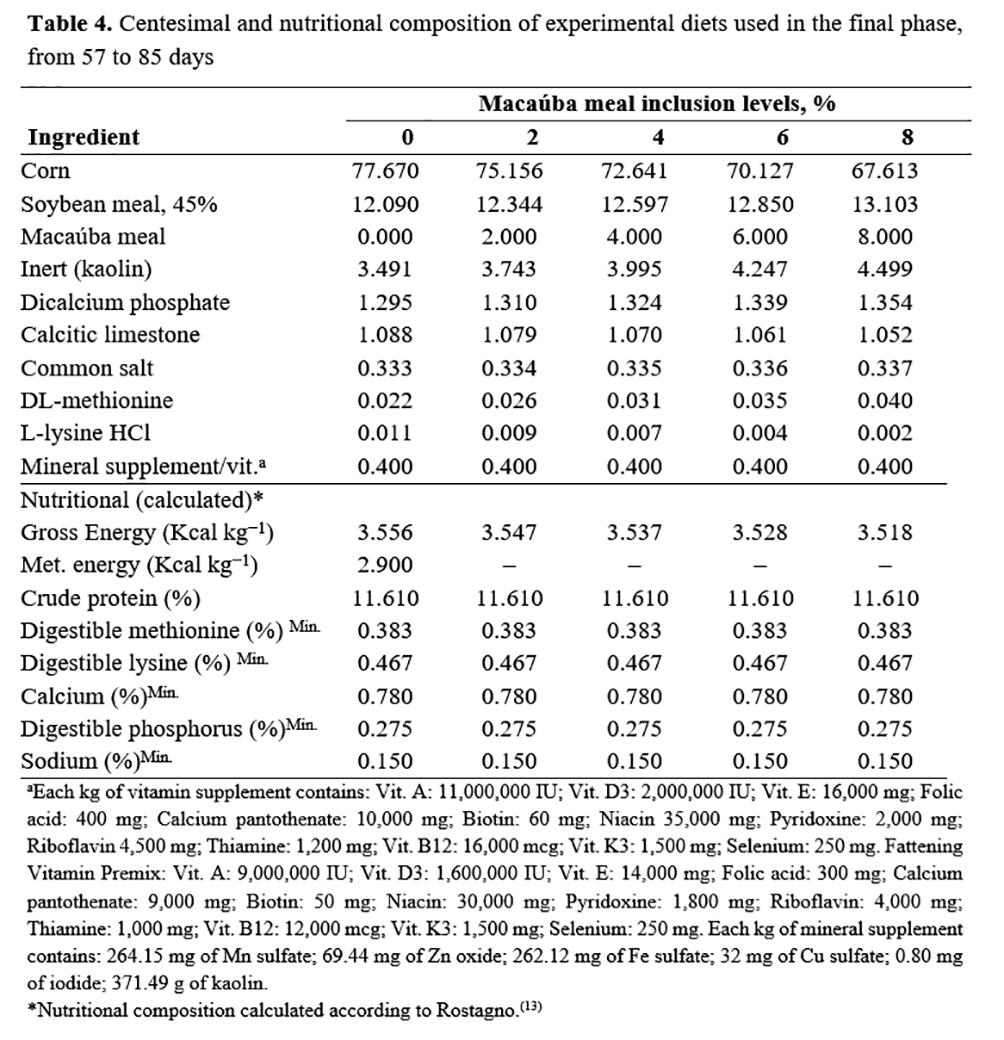
The color was determined with a Minolta colorimeter, which considers the coordinates L* (black/ white), responsible for luminosity, a* (green/red), related to red content, and b* (blue/yellow) related to yellow content.(15) Water retention capacity was determined according to the methodology described by Silva Sobrinho.(16)
The data were submitted to linear or quadratic regression analysis, according to the best fit for each studied variable, using the statistical program SAS 9.0.(17)
Results
The average minimum and maximum temperatures registered during the experimental period inside the shed were 26 and 29 °C, respectively.
No significant effects (P>0.05) of including different macaúba meal levels in the diets were observed on feed intake in the period from 1 to 28 days. However, a decreasing linear effect was observed on weight gain (Y = −18.488x + 1152.7; R2 = 0.95) and an increasing linear effect on feed conversion, as shown in the equation Y = 0.0424x + 1.9456 (R2 = 0.89) (Table 5).
Macaúba meal levels did not influence (P>0.05) animal performance in the periods from 29 to 56 and 57 to 85 days, showing adaptation to the diet. However, an influence (P<0.05) of macaúba meal levels was observed during the accumulated experimental period (1 to 85 days), leading to linear increase in feed conversion (Y = 0.0218x + 2.3884; R2 = 0.78) and a linear decrease on weight gain (Y = −24.8x + 314.4; R2 = 0.810) and body weight at 85 days, as shown in the equation Y = −24.558x + 3187 (R2 = 0.81).
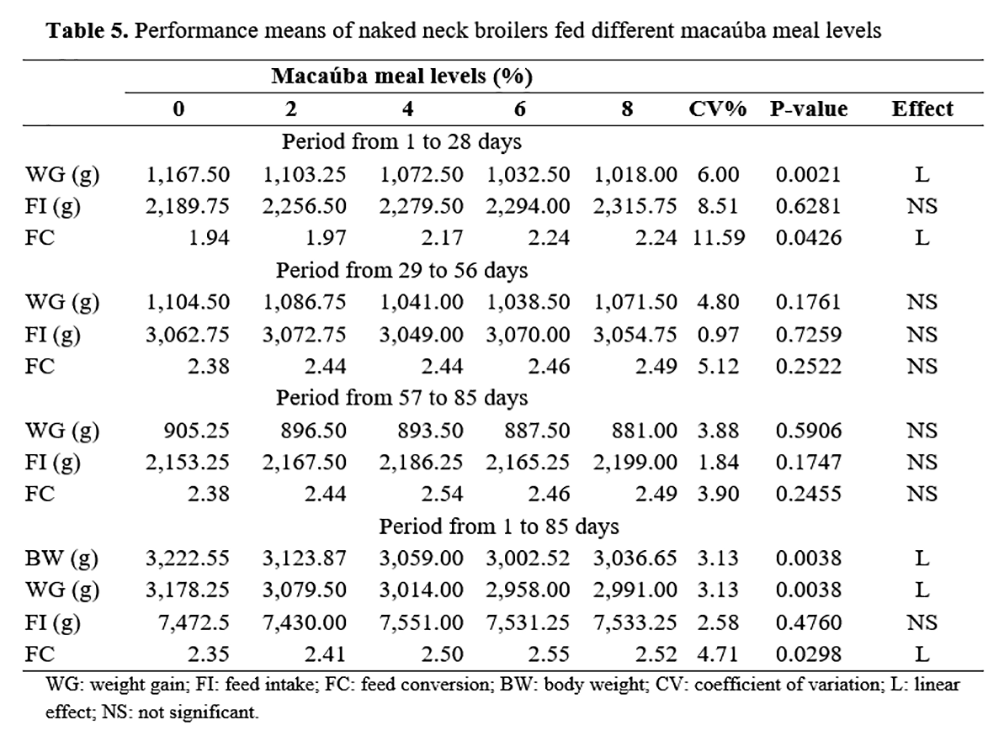
Regarding carcass yields (Table 6), macaúba meal levels in the diets provided a linear increase in abdominal fat (Y = 0.078x + 2.434; R2 = 0.87) and consequent reduction in carcass yield (Y = −0.0905x + 70.254; R2 = 0.93).
Breast and drumstick + thigh yields were not influenced (P>0.05) by macaúba meal levels.
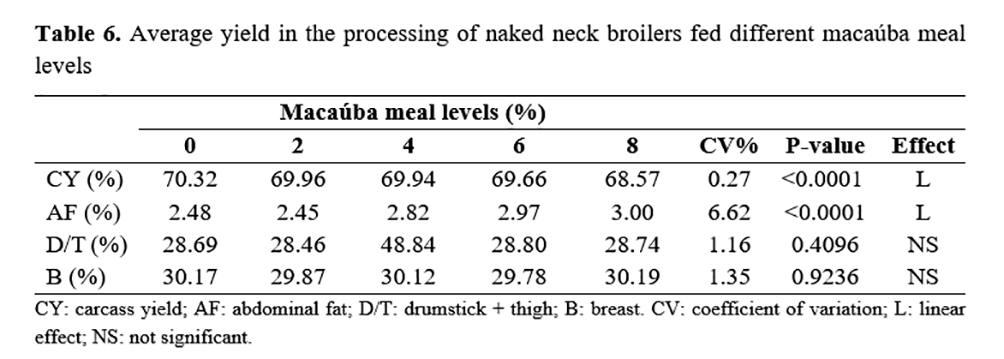
Luminosity (L*) of breast and drumstick + thigh was not influenced (P>0.05) by the inclusion of macaúba meal in the animal feeding (Table 7).
A decreasing linear effect was observed on the red content (a*) of breast, following macaúba meal inclusion (Y = −0.0705x + 4.666; R2 = 0.616).
Inclusion levels of the alternative feed resulted in increasing linear behavior on breast pH (Y = 0.0286x + 2.242; R2 = 0.622) and ethereal extract deposition in the breast (Y = 0.0286x + 2.242; R2 = 0.621) and drumstick + thigh (Y = −0.0114x + 0.9525; R2 = 0.748).
Macaúba meal levels resulted in a decreasing linear effect on drumstick + thigh moisture (Y = −0.0461x + 75.711; R2 = 0.737), breast ash content (Y = −0.0114x + 0.9525; R2 = 0.748), and drumstick + thigh ash content (Y = −0.011x + 1.038; R2 = 0.444).
The yellow content (b*) in the drumstick + thigh increased linearly according to the equation Y = 0.0392x + 8.6055 (R2 = 0.783) as macaúba meal levels were increased in the broiler diet.
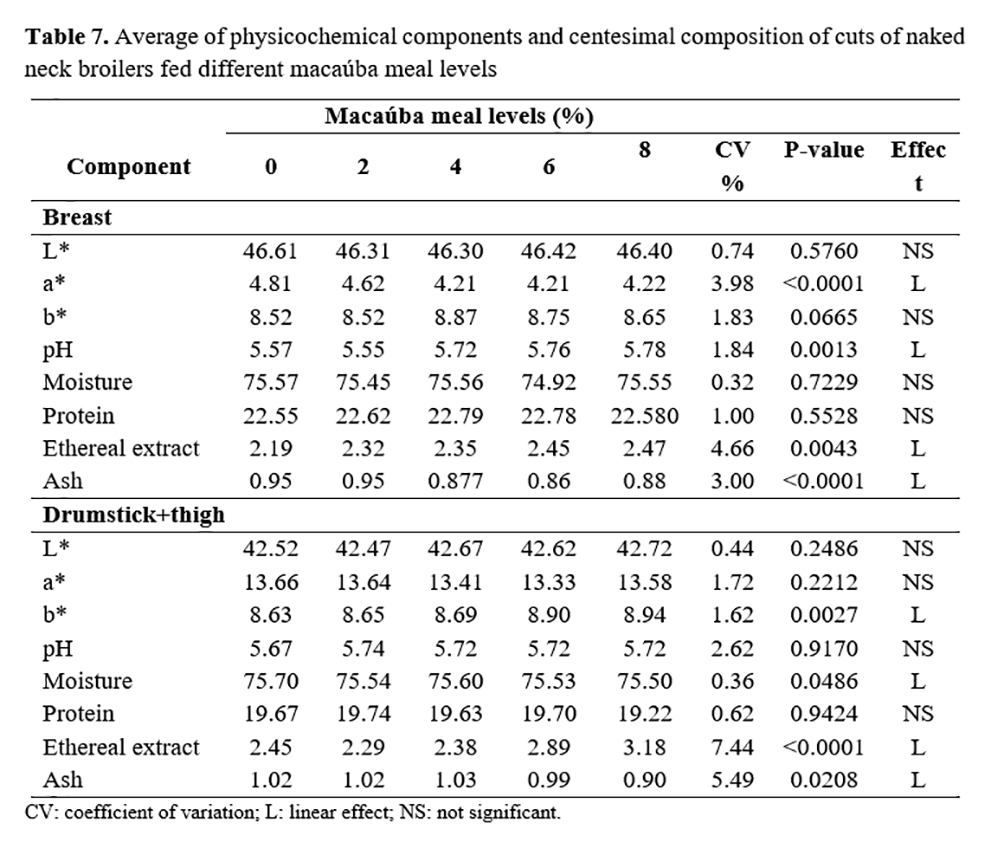
Discussion
The range of temperature variation recorded in the experimental period is in accordance with the thermal welfare for broilers.(12)
The negative effect on weight gain from 1 to 28 days may be related to the immaturity of the gastrointestinal tract in metabolizing nutrients contained in the experimental diets, considering that nutrient utilization is improved with the advancing age of animals as a function of higher production of digestive enzymes and increase in organ size.(18)
The lack of effect on feed intake, associated with lower weight gain at 28 days, justifies the worsening in feed conversion during this period. Although there was no effect on feed intake, the availability of protein and amino acids, nutrients required in larger quantities in the initial phase of broilers,(13) may have been reduced, directly influencing performance.
Results showed that macaúba meal inclusion in the diet of naked neck broilers significantly compromises weight gain and, consequently, body weight at slaughter and feed conversion due to the high crude fiber content (28.540%). Fibers in non-ruminant diets affect the availability of other nutrients, influences the action on passage rate,(19) digesta viscosity, water retention capacity, and the performance in the bond with minerals and organic molecules.(20)
The results for carcass yield are an indication of lower protein and amino acid availability of diets containing macaúba meal. This imbalance in protein utilization favored the deposition of adipose tissue such as abdominal fat,(21) and this excess influenced carcass yields, as abdominal fat is neglected in gutting, which is a problem for the poultry industry.(22, 23)
The effect of macaúba levels on a* content of breast cut is related to the influence of pH on light absorption, affecting myoglobin on green light absorption, making the meat appear less red.(24)
A higher deposition of ethereal extract was observed in the breast section, which demonstrates the excess energy available, which contributes to ATP formation and, consequently, favored the deposition of glycogen reserve, which is related to the speed in the establishment of rigor mortis,(25) being closer to the pH range considered adequate between 5.70 and 5.96.(26, 27) The absence of effect on drumstick + thigh pH was due to the dominance of type I muscle fibers presented in this section, resulting in lower glycolytic potential.(28)
The increase in the deposition of ethereal extract in the breast and drumstick + thigh may be related to the fatty acid profile of macaúba meal. As observed by Nunes et al.,(29) macaúba is rich in palmitic acid belonging to the group of saturated fatty acids, which have a higher influence on fat content in meat.(30, 31)
The higher moisture content in the drumstick followed an inversely proportional relationship between ethereal extract and moisture, as observed by Özdogan and Aksit,(32) who associated this relationship to the dietary lipid source.
Considering that there was an increase in the ethereal extract content of the breast and drumstick + thigh cuts, and that they constitute one of the organic fractions of the total composition, the relationship between proportion of organic/inorganic matter of carcasses when compared to an increase of macaúba meal levels justifies the lower gray values obtained for both cuts.
Knowing that pigmentation in poultry meat is strongly affected by carotenoid intake,(33) the increase in drumstick color b* suggests that macaúba meal inclusion in poultry diets increases pigmentation, which is a consumer-appreciated feature of free-range chicken meat.
Conclusion
Macaúba meal inclusion in the diet of naked neck broilers impaired performance by increasing dietary intake, impairing feed conversion and reducing carcass yields by increasing abdominal fat deposition. However, it favors breast, drumstick, and thigh colors, as it is rich in carotenoids.
References
1.
Rodrigues RM, Fernandes EA, Caires CM, Fagundes NS, Oliveira BR, Torido
LC. Efeito do glúten de milho no desempenho de frangos de corte. Revista
Brasileira de Ciência Avícola [Internet]. 2008, 10(1):86-92. Available
from:
aviex.famev.ufu.br/node/53.
Portuguese.
2. Abreu IS, Carvalho CR, Carvalho GM, Motoike SY. First
karyotype, DNA C-value and AT/GC base composition of macaw palm (Acrocomia
aculeata) – a promising plant for biodiesel production. Australian
Journal Botany [Internet] 2011, 59(2):149-155. Available from: https://doi.org/10.1071/BT10245. English.
3.
Ramos MIL, Ramos Filho MM, Hiane PA, Braga Neto JÁ, Siqueira EMA.
Qualidade nutricional da polpa de bocaiúva Acrocomia aculeata (Jacq.)
Lodd. Ciência e Tecnologia de
Alimentos [Internet]. 2008, 28(suple 0):90-94. Available
from:
http://dx.doi.org/10.1590/S0101-20612008000500015.
Portuguese.
4.
Ciconini G, Favaro SP, Roscoe R, Miranda CHB, Tapeti CF, Miyahira MAM,
Bearari L, Galvani F, Borsato AV, Colnago LA, Naka MH. Biometry and oil contents of Acrocomia aculeata fruits
from the Cerrados and Pantanal biomes in Mato Grosso do Sul, Brazil. Industrial
Crops and Products
[Internet].
2013, 45(1):208-214. Available from: https://doi.org/10.1016/j.indcrop.2012.12.008. English.
5.
Amaral FP, Broetto F, Batistella CB, Jorge SMA. Extração e
caracterização qualitativa do óleo da polpa e amêndoas de frutos de
macaúba [acrocomia aculeata (jacq) lodd. ex mart] coletada na
região de Botucatu, SP. Revista
Energia na Agricultura [Internet].
2011, 26(1):12-20. Available
from:
http://dx.doi.org/10.17224/EnergAgric.2011v26n1p12-20.
Portuguese.
6. Coimbra M C, Jorge N. Characterization of the Pulp and
Kernel Oils from Syagrus leracea, Syagrus romanzoffiana, and Acrocomia
aculeata. Journal Food
Science [Internet]. 2011, 76(8):1156- 1161. Available from: http://dx.doi.org/10.1111/j.1750-3841.2011.02358.x. English.
7.
Abdalla AL, Silva Filho JC, Godoi AR, Carmo CA, Eduardo JLP. Utilização
de subprodutos da indústria de biodiesel na alimentação de ruminantes.
Revista Brasileira de Zootecnia [Internet]. 2008, 37(suplemento
especial):260-258. Available
from:
http://dx.doi.org/10.1590/S1516-35982008001300030.
Portuguese.
8.
Barreto
SMP.
Avaliação do valor nutritivo da torta de macaúba (Acrocomia Aculeata
(Jacq.) Lodd. ex Mart.) na alimentação de caprinos. [Dissertação].
Montes Claros: Programa de Mestrado em Ciências Agrárias; 2008. 74p.
[Acesso 2017 nov 22]. Disponível em: http://www.bibliotecadigital.ufmg.br/dspace/bitstream/handle/1843/NCAP-8A8FMY/disserta__o_silene.pdf?sequence=1.
Portuguese.
9.
Azevedo
RA, Rufino LMA, Santos ACR, Silva LP, Bonfá HC, Duarte ER, Geraseev LC.
Desempenho de cordeiros alimentados com inclusão
de torta de macaúba na dieta. Pesquisa Agropecuária Brasileira [Internet].
2012, 47(11):1663-1668. Available
from:
http://dx.doi.org/10.1590/S0100-204X2012001100014.
Portuguese.
10.
Sobreira
HF, Lana RP, Mancio AB, Fonseca DM, Motoike SY, Silva JCPM, Guimarães G.
Casca e coco de macaúba adicionados ao concentrado para vacas mestiças
lactantes em dietas à base de silagem de Milho. Revista Brasileira de
Agropecuária Sustentável [Internet]. 2012, 2(1):113-117. Available
from:
http://dx.doi.org/10.21206/rbas.v2i1.65.
Portuguese.
11. Azevedo RA, Rufino
LMA, Santos ACR, Ribeiro Júnior CS, Geraseev
LC. Comportamento ingestivo de cordeiros alimentados com torta de
macaúba. Arquivo Brasileiro de
Medicina Veterinária e Zootecnia [Internet]. 2013, 65(2):
490-496. Available
from:
http://dx.doi.org/10.1590/S0102-09352013000200027. Portuguese.
12.
Globoaves.
Manual de manejo linha colonial Globoaves [Internet].
2011. 20p. Available from: https://www.levy.blog.br/arquivos/aula-fesurv/downs-241-0.pdf. Portuguese.
13.
Rostagno
HS, Albino LFT, Donzele JL, Gomes PC, Lopes DC, Ferreira AS, Barreto
SLT. Tabelas Brasileiras para Aves e Suínos. Viçosa: UFV, 2011. Portuguese.
14.
Horwitz W. Official methods of
analysis of Association of Official Analytical Chemists. 13.ed. Whashington: AOAC [Internet]. 1990, 1018p. Available from: https://law.resource.org/pub/us/cfr/ibr/002/aoac.methods.1.1990.pdf. English.
15. Miltenburg GAJ, Wensing TH, Smulders FJM. Relationship
between blood hemoglobin, plasma and tissue iron, muscle heme pigment,
and carcass color of veal. Journal Animal Science [Internet]. 1992,
70(9):2766-2772. Available from: http://dx.doi.org/10.2527/1992.7092766x. English.
16. Silva Sobrinho, AG. Body composition and characteristcs of
carcass from lambs of different genotypes and ages at slaughter.
Palmerston North: Massey University [Internet]. 1999. 54p. Report
(PostDoctorate in sheep Meat Production) – Massey. Available from: http://www.scielo.br/scielo.php?script=sci_nlinks&ref=000093&pid=S0102-0935200700040003600019&lng. English.
17. SAS INSTITUTE. SAS/INSIGHT User's guide: versão para
Windows. Versão
9.1. Cary, 1998.
18. Sakomura NK, Bianchi MD, Pizauro Jr, JM, Café MB, Freitas ER. Efeito
da idade dos frangos de corte na atividade enzimática e digestibilidade
dos nutrientes do farelo de soja e soja integral. Revista Brasileira de
Zootecnia, [Internet].
2004. v.33,
n.4: 924-935. Available from: http://dx.doi.org/10.1590/S1516-35982004000400013.
Portuguese.
19.
Souza JPL, Rodrigues KF, Albino LFT, Vaz
RGMV, Silva GF, Siqueira JC, Santos Neta ER, Parente IP, Amorim AF,
Silva MC. Bagaço
de
mandioca com ou sem complexo enzimático em dietas de frangos de corte.
Archivos de Zootecnia, [Internet]. 2014. v.63, n.244: 657-664. Available
from:
https://doi.org/10.21071/az.v63i244.514.
Portuguese.
20.Morgado
E, Galzerano L. Fibra
na nutrição de animais com fermentação no intestino grosso. Revista
Electrónica de Veterinária, [Internet]. 2009. v. 10, n. 7, p. 1-13. Available
from:
http://www.veterinaria.org/revistas/redvet/n070709/070902.pdf.
Portuguese.
21.Meza SKL, Nunes RV, Tsutsumi CY, Vieites FM, Scherer C, Henz JR,
Silva IM, Bayerle DF. Níveis de energia metabolizável e lisina
digestível sobre a composição e rendimento de carcaça de frangos de
corte. Semina:
Ciências Agrárias,
[Internet]. 2015
v. 36, n. 2: 1079-1090. Available from: https://doi.org/10.5433/1679-0359.2015v36n2p1079.
Portuguese.
22. Scheuermann
GN, Maier JC, Bellaver C, Fialho FB. Metionina
e lisina no desenvolvimento de frangos de corte. Revista Brasileira de
Agrociência, [Internet]. 1995, v.1(2): 75-86. Available
from
https://www.periodicos.ufpel.edu.br/ojs2/index.php/CAST/article/download/122/120.
Portuguese.
23. Wiseman J, Lewis C. Influence concentration on the growth of body
weight ando f carcass componentes of broiler chickens. Journal of
Agricultural Science [Internet]. 1998. V, 131: 361-371. Available from: https://doi.org/10.1017/s0021859698005851 . English.
24. Faria
PB, Bressan MC, Souza XR. Composição proximal e qualidade da carne de
frangos das linhagens Paraíso Pedrês e Pescoço Pelado. Revista
Brasileira de Zootecnia [Internet]. 2009, 38(12):2455-2464. Available
from:
http://dx.doi.org/10.1590/S1516-35982009001200023. Portuguese.
25.
Rodrigues TP, Silva TJP. Caracterização
do
processo de rigor mortis e
qualidade da carne de animais abatidos no Brasil. Arquivos de Pesquisa
Animal, [Internet].
2016, v.1, n.1, p.1 - 20, 2016. Available from: https://www2.ufrb.edu.br/apa/component/phocadownload/category/18-ano-16-vol1?download=176:caracterizacao-do-processo-de-rigor-mortis-e-qualidade-da-carne-de-animais-abatidos-no-brasil.
Portuguese.
26.Oliveira MC, Carvalho ID. Rendimento e lesões em carcaças de frangos
de corte criados em diferentes camas e densidades populacionais. Ciência
Agrotécnica [Internet]. 2002, 26(5):1076-1081. Available
from:
https://www.researchgate.net/publication/237804150.
Portuguese.
27.
Oliveira FR, Boari CA, Pires AV, Mognato JC, Carvalho RMS, Santos Junior
MA, Mattioli CC. Jejum alimentar e qualidade da carne de frango de corte
tipo caipira. Revista Brasileira de Saúde e Produção Animal [Internet].
2015, 16(3):667-677. Available
from: http://dx.doi.org/10.1590/S1519-99402015000300017. Portuguese
Dransfield SosnickiRelationship between muscle growth and poultry meat
quality Poultry Science, Volume 78, Issue 5, May 1999: 743–746.
https://doi.org/10.1093/ps/78.5.743. English.
29. Nunes AAL, Favaro
SP, Galvani F. Perfil de ácidos graxos em óleo de polpa de macaúba bruto
e refinado submetidos a ensaio termoxidativo em diferentes
intervalos de tempo. Available from: https://ainfo.cnptia.embrapa.br/digital/bitstream/item/94092/1/PERFIL-DE-ACIDOS-GRAXOS-EM-OLEO-DE-POLPA-DE-MACAUBA-BRUTO-E-REFINADO-SUBMETIDOS-AO-ENSAIO-TERMOXIDATIVO-EM-DIFERENTES-INTERV-angela-nunes-final.pdf. Portuguese.
30.Ponnampalam
EM, Sinclair AJ, Egan AR, Blakeley SJ, Li D, Leury BJ. Effect of dietary modification of muscle long chain n‑3
fatty acid on plasma insulin and lipid metabolites, carcass traits, and
fat deposition in lambs. [Internet]. 2001. Journal of Animal Science, v.79, p.895-903. Available from:
https://doi.org/10.2527/2001.794895x. English.
31. Scheeder MRL, Gumy D, Messikommer R, Wenka C, Lambelet P.
Effect of PUFA at sn-2 position in dietary triacylglycerols on the fatty
acid composition of adipose tissues in nonruminant farm animals.
European Journal of Lipid Science and Technology, [Internet]. 2003, v. 105, n. 2: 74–82. https://doi.org/10.1002/ejlt.200390020. English.
32.Ozdogan M, Aksit M. Effects of the feeds containing different fats on
carcass and blood parameters of broilers. Journal of Applied Poultry
Research. [Internet]. 2003; 12:251-256.Avaliable from: https://doi.org/10.1093/japr/12.3.251. English.
33. Pérez-Vendrell AM, Hernández JM, Llauradó L, Schierle J, Brufau J. Influence of source and ratio of xanthophyll pigments on
broiler chicken pigmentation and performance. Poult Sci. 2001 [Internet] v.80(3):320-6. Avaliable from: https://doi.org/10.1093/ps/80.3.320. English.